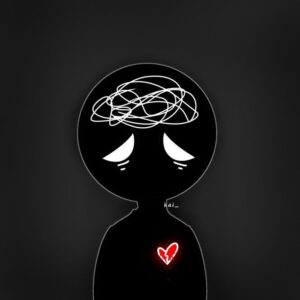Depression is a complex mental health disorder that affects a person’s mood, thoughts, behaviors, and physical well-being. It’s more than just feeling sad or going through a rough patch. It’s a persistent condition that requires understanding. Support and often medical treatment are necessary.

Depression is clinically known as Major Depressive Disorder (MDD). It is a mood disorder characterized by persistent feelings of sadness and hopelessness. Individuals lose interest or pleasure in activities. They also experience a range of emotional and physical problems. It interferes with daily functioning and quality of life.
Symptoms Include:
- Persistent low mood or sadness
- Loss of interest in activities once enjoyed
- Changes in appetite (weight gain or loss)
- Sleep disturbances (insomnia or oversleeping)
- Fatigue or lack of energy
- Feelings of worthlessness or excessive guilt
- Difficulty concentrating or making decisions
- Suicidal thoughts or attempts
A diagnosis is typically made if symptoms last more than two weeks and interfere with normal life.
Causes of Depression
Depression does not usually have a single cause but arises from a combination of biological, psychological, and environmental factors. Here are the key contributors:
1. Biological Factors
- Genetics: A family history of depression increases the risk. Certain genes may affect brain chemistry and mood regulation.
- Neurotransmitter Imbalance: Low levels of brain chemicals like serotonin, dopamine, and norepinephrine are linked to depressive symptoms.
- Hormonal Changes: Hormonal imbalances due to thyroid issues, menopause, postpartum changes, or other conditions can contribute to depression.
2. Psychological Factors
- Trauma and Abuse: Childhood abuse, loss of a parent, neglect, or emotional trauma can make people more vulnerable.
- Low Self-Esteem: Negative self-image or chronic self-criticism increases the risk.
- Cognitive Patterns: Pessimistic thinking, catastrophizing, and rumination are often involved.
3. Environmental and Social Factors
- Chronic Stress: Ongoing stress from work, relationships, or financial issues can trigger depression.
- Social Isolation: Lack of a supportive social network can deepen depressive symptoms.
- Life Events: The death of a loved one, divorce, job loss, or other major life changes can act as triggers.
Cure and Treatment of Depression
While depression can be serious, it is treatable in most cases. The best treatment depends on the individual but often includes a combination of the following:
1. Psychotherapy (Talk Therapy)
- Cognitive Behavioral Therapy (CBT): Helps change negative thought patterns and behaviors.
- Interpersonal Therapy (IPT): Focuses on relationships and social functioning.
- Psychodynamic Therapy: Explores unconscious thoughts and past trauma.
2. Medication
- Antidepressants: Common types include:
- SSRIs (e.g., fluoxetine, sertraline)
- SNRIs (e.g., venlafaxine, duloxetine)
- Tricyclic antidepressants and MAOIs (less commonly used)
- They may take several weeks to work and are often used in moderate to severe cases.
3. Lifestyle Changes
- Regular Exercise: Improves mood by releasing endorphins.
- Healthy Diet: Supports brain health.
- Sleep Hygiene: Proper sleep habits can reduce symptoms.
- Mindfulness and Meditation: Reduce stress and promote emotional balance.
4. Social Support
- Support Groups: Sharing experiences can reduce isolation.
- Family and Friends: A strong support network is crucial for recovery.
5. Other Treatments
- Electroconvulsive Therapy (ECT): Used in severe, treatment-resistant cases.
- Transcranial Magnetic Stimulation (TMS): Non-invasive brain stimulation.
- Ketamine or Esketamine: New treatments for fast-acting relief in severe cases.
Can Depression Be Cured?
While some people may experience a complete remission after treatment, others might have recurring episodes. In many cases, depression can be managed effectively, allowing people to lead fulfilling lives. Early intervention increases the chances of successful recovery.
Depression is a real, common, and serious condition that arises from a complex interplay of factors. It affects millions but is highly treatable with the right combination of therapy, medication, and lifestyle support. Understanding and compassion — both from within and from others — play a critical role in healing.













